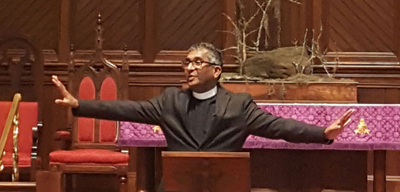
From the Free Lance-Star March 6, 2017 by Katrina Dix
How does a Christian reverend come to deliver the funeral service for a Hindu?
When it was a last wish of the deceased.
Relating the story Sunday during the last talk of a Lenten Weekend program, “Being Passionately Christian and Becoming Compassionately Interfaith,” at St. George’s Episcopal Church, the Rev. Sathianathan Clarke spoke on ways to think about religion in a climate of nationalism and religious hostility.
The reverend teaches on Gandhi, Martin Luther King Jr. and other topics as the Bishop Sundo Kim Chair for World Christianity at Wesley Theological Seminary in Washington, D.C.
“I think the context that we are all in is a celebration of borders, of boundaries, of walls and fences … because of what’s happening around the Muslim community, and our own putting up of fences in the name of our security as Christians as well,” Clarke said after his talk. “I can understand why people want security as citizens of a country.”
But rather than guarding religion against some kind of attack, he said, “I am convinced that for the citizens of the kingdom of God, risk is the first step, security the second.”
Clarke called his acquaintance with the Hindu man who asked that he give the funeral service an “interfaith border crossing.”
A little over 20 years ago, a congregant of his in Cambridge, Mass. was a home nurse for a gentleman from South India who was dying.
She mentioned Clarke, who is also from South India. The reverend was invited to visit the patient, and returned many times.
“I showed up, sometimes I’d wear a collar, you know, to show that I was a Christian priest, thinking he might … say ‘Pray for me, Father.’ It never happened,” Clarke said, smiling.
But when the man died, his children called Clarke. They told him their father’s last wish was for Clarke to deliver his funeral service.
When he prayed before the service, Clarke said, he made an odd decision.
“ ‘Jesus, for once, just don’t be mean about these things. I want to pray from God,’ “ Clarke said he prayed.
His talks this weekend circled this topic—the largeness, or spaciousness, of God, beyond Christianity.
Quoting Desmond Tutu, Clarke said, “God is bigger than Christianity and cares for more than Christians. He has to, if only for the simple reason that Christians are very late arrivals on the world scene. God has been around since even before the creation, and that is a very long time.”
After delivering a talk on prayer on Saturday, leading a discussion of aspects of peacemaking in Islam, Buddhism, and Christianity on Sunday morning, and preaching the late morning Sunday service, Clarke spoke Sunday afternoon about a close reading of a well-known chapter of the Gospel of John.
He focused on the beginning of the 14th chapter, which includes the verse “No one comes to the Father except through me.” The verse is often interpreted as restrictive, Clarke said.
But before that, the chapter also includes the verse, “In my Father’s house there are many mansions,” or dwelling-places. Clarke believes the latter means there is space for others.
Recognizing that “fullness,” he said, allows him to share his faith passionately, but with humility. It allows him to take the risk of crossing the borders between religions, without devaluing the religion of those to whom he speaks.
Herbert Green, a retired professor attending the talk, said he found the idea of peace powerful.
“I think words matter. This notion about peace becomes a bridge. And to the extent that we can find words that build bridges, it will help us,” Green said.
Another attendee, Fredericksburg resident Meghan O’Connor, referred to statements Gandhi made to the effect that each of the faithful should be the truest to that faith they could be.
In the Jan. 19, 1928 edition of his weekly journal, “Young India” Gandhi wrote, “I came to the conclusion long ago that all religions were true and also that all had some error in them, and whilst I hold by my own, I should hold others as dear as Hinduism. So we can only pray, if we are Hindus, not that a Christian should become a Hindu. But our innermost prayer should be a Hindu should be a better Hindu, a Muslim a better Muslim, a Christian a better Christian.”
Clarke responded that Gandhi was in general opposed to, or did not believe in, conversion, and Clarke does. But Clarke agrees with the need for humility and the recognition of beauty and peace, he said.
That is, in some ways, the mission he feels Christian leaders have in a nation that seems to be seeking security, and at times to be stoked towards fear, he said after the talk.
“I can understand the need for ways of holding oneself secure as a nation-state, as a community, as a people,” Clarke said. “[But] I’m also very aware that much of this is rhetoric that is built up where we need not fear, and yet we fear. I think that ministers of Christianity, I think our job is constantly to try and remind people of their own truthful calling.”
